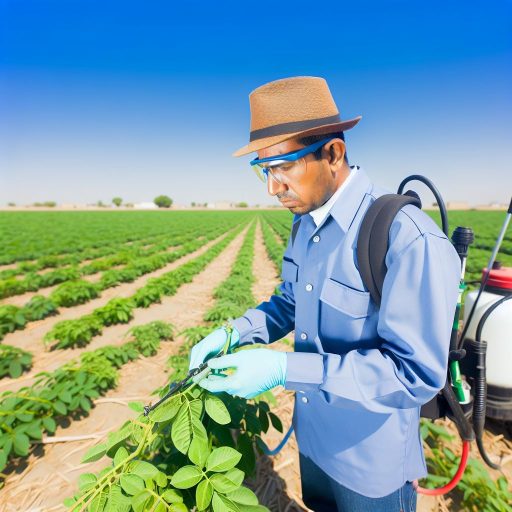Introduction
In the world of agricultural loans, collateral plays a crucial role in securing financing for farmers and agricultural businesses.
Collateral refers to assets or property that a borrower pledges to a lender as security for a loan.
When it comes to agricultural loans, collateral can include land, machinery, livestock, crops, or any other valuable assets that can be used to guarantee the repayment of the loan.
Lenders typically require collateral as a form of protection in case the borrower defaults on the loan.
Types of Collateral
Collateral plays a crucial role in securing agricultural loans.
It provides lenders with a form of security in case of default.
Let’s dive into the different types of collateral commonly used in agricultural loans.
Tangible Collateral
- Land and Real Estate: One of the most traditional forms of collateral in agricultural loans is the physical land and real estate owned by the borrower.
- Machinery and Equipment: Farmers often use their farming equipment, such as tractors, harvesters, and irrigation systems, as collateral when applying for loans.
- Livestock: In the livestock industry, animals like cattle, poultry, and swine can be used as collateral, providing lenders with tangible assets.
- Crops: Growing crops can also serve as collateral, where the lender holds a security interest in the agricultural produce until the loan is repaid.
Intangible Collateral
- Accounts Receivable: In some cases, farmers can pledge their accounts receivable as collateral, giving lenders a claim on the money owed to the borrower.
- Intellectual Property: Agricultural businesses with valuable intellectual property, such as trademarks, patents, or proprietary technologies, can use these intangible assets as collateral.
- Government Subsidies: Subsidies from government programs can be considered as collateral, especially in cases where the loan is tied to specific agricultural projects or initiatives.
- Insurance Policies: Farmers can also assign their insurance policies as collateral, providing lenders with a guarantee in case of unforeseen events impacting the borrower’s ability to repay the loan.
Understanding the various types of collateral available for agricultural loans is essential for both lenders and borrowers.
By utilizing different forms of collateral, farmers can secure the financing needed to invest in their operations.
Additionally, this ensures the sustainability of their agricultural businesses.
Factors Considered in Determining Collateral
When it comes to agricultural loans, lenders take into account various factors to determine the type and amount of collateral required.
Credit History
Lenders consider the borrower’s credit history to assess their ability to repay the loan.
A good credit score can lower the collateral requirement.
Loan Amount
The size of the loan influences the collateral needed.
Larger loans typically require more valuable collateral to mitigate the lender’s risk.
Loan Purpose
The intended use of the loan plays a role in determining collateral.
Projects with higher returns may require less collateral.
Collateral Value
The value of the collateral is crucial in relation to the loan amount.
Lenders assess the market value of the collateral to ensure it covers the loan.
Type of Collateral
The type of collateral offered affects the lender’s decision.
Transform Your Career Today
Unlock a personalized career strategy that drives real results. Get tailored advice and a roadmap designed just for you.
Start NowReal assets like land or equipment are preferred due to their stability and value.
Risk Assessment
Lenders conduct a risk assessment to evaluate the borrower’s ability to repay the loan.
Higher risk borrowers may need more collateral to secure the loan.
Industry Trends
Current trends in the agricultural industry can impact the collateral requirements.
Lenders may adjust their criteria based on market conditions.
Borrower’s Equity
The borrower’s equity in the project is considered when determining collateral.
Higher equity may reduce the need for additional collateral.
Cash Flow
Lenders analyze the borrower’s cash flow to assess their repayment capacity.
Strong cash flow can influence the collateral requirements positively.
Loan Terms
The terms of the loan, such as interest rates and repayment period, can affect the collateral needed.
Riskier terms may require more collateral.
You Might Also Like: Top Skills for Artificial Insemination Technicians
Collateral Evaluation Process
When it comes to securing agricultural loans, collateral plays a crucial role in the lending process.
The collateral evaluation process is essential for both the lender and the borrower.
Steps involved in the collateral evaluation process
- Determine the type of collateral required.
- Collect all necessary information about the collateral.
- Conduct a physical inspection of the collateral.
- Assess the value of the collateral.
- Verify the title and ownership of the collateral.
Importance of a thorough evaluation to mitigate risks for both the lender and borrower
A comprehensive collateral evaluation process is crucial for both lenders and borrowers to mitigate risks associated with agricultural loans.
Here are some reasons why a thorough evaluation is necessary:
- Risk Mitigation: By evaluating the collateral thoroughly, lenders can assess the risk associated with the loan and make informed decisions.
- Asset Protection: Proper evaluation helps protect the lender’s assets in case of default by the borrower.
- Borrower Protection: A thorough evaluation ensures that borrowers are not over-leveraged and can repay the loan without defaulting.
- Loan Approval: A well-documented evaluation process increases the chances of loan approval for borrowers, as it provides the lender with confidence in the collateral’s value.
- Confidence Building: Both parties can have trust and confidence in the loan agreement when the collateral is thoroughly evaluated.
The collateral evaluation process is a crucial step in the agricultural loan application process.
Both lenders and borrowers should prioritize a comprehensive assessment to mitigate risks and ensure a successful loan transaction.
Explore Further: Crop Rotation and Planning for Farm Managers
Showcase Your Business Today
Reach thousands of readers actively exploring professional services. Publish your business profile and grow your audience now.
Publish NowWhen applying for an agricultural loan, one key factor that lenders consider is the collateral provided by the borrower.
The presence of sufficient and valuable collateral can significantly impact the approval of the loan.
In this section, we will discuss the impact of collateral on loan approval and why having valuable collateral is important for securing financing.
How Collateral Quality and Quantity Affect Loan Approval
The quality and quantity of collateral offered by a borrower can greatly influence the approval of agricultural loans.
Lenders use collateral as a form of security to minimize their risk in case the borrower defaults on the loan.
Therefore, having valuable collateral that is sufficient to cover the loan amount can increase the likelihood of loan approval.
Lenders typically prefer collateral that is easily liquidated and has a high market value.
For agricultural loans, acceptable collateral may include land, livestock, equipment, crops, or other tangible assets related to farming operations.
The value of the collateral is assessed by the lender to determine its adequacy in securing the loan.
Additionally, lenders consider the condition and marketability of the collateral when evaluating loan applications.
Collateral that is in good condition and in high demand in the market is more likely to be accepted by lenders as it provides a higher level of security for the loan.
Importance of Valuable Collateral in Securing Financing
Having valuable collateral is crucial for securing financing for agricultural operations.
It not only increases the chances of loan approval but also allows borrowers to negotiate favorable loan terms and interest rates.
Valuable collateral provides a sense of security to lenders, making them more willing to extend credit to borrowers.
Furthermore, valuable collateral can help borrowers access larger loan amounts and more competitive financing options.
Lenders may be more willing to lend money at lower interest rates or with longer repayment terms if they are confident in the quality and value of the collateral securing the loan.
In some cases, borrowers may be able to use the same collateral to secure multiple loans or lines of credit, enabling them to finance various aspects of their agricultural operations.
This flexibility is especially beneficial for farmers who require financing for different purposes throughout the year, such as purchasing equipment, livestock, or inputs.
Borrowers should carefully assess their collateral options and ensure they meet the lender’s requirements to maximize their chances of securing the necessary funding for their farming activities.
Gain More Insights: Latest Trends in Irrigation Technology for Specialists

Risks Associated with Collateral
Market value fluctuations can affect collateral value.
Collateral, such as machinery or livestock, can depreciate, affecting loan value.
Weather-related risks pose a threat to agricultural operations.
Natural disasters can destroy crops or property used as collateral.
This destruction impacts the ability to repay loans.
Operational risks include inefficient farm management.
Unexpected costs can lead to default on the loan.
Ways to Mitigate Risks Associated with Collateral Default
Regular appraisals can help maintain awareness of collateral value.
Conduct periodic evaluations of collateral to ensure its value aligns with loan terms.
Diversification of collateral can spread risk across various assets.
Using a variety of assets as collateral minimizes impact.
Insurance coverage is crucial for protecting collateral.
This coverage provides financial security in case of damage or loss.
Proper documentation is essential for clear agreements.
Maintain accurate records of collateral details and loan agreements.
Early communication is important when facing repayment issues.
Notify the lender immediately if there are concerns about repaying the loan to seek assistance.
Implement risk management strategies to address challenges proactively.
By understanding and addressing these risks, borrowers can navigate agricultural loans effectively and protect their assets.
Uncover the Details: Steps to Become a Quality Control Inspector in Farming
Showcase Your Business Today
Reach thousands of readers actively exploring professional services. Publish your business profile and grow your audience now.
Publish NowIntroduction to Alternative Collateral
Alternative collateral refers to assets other than land, equipment, or livestock that can be used to secure agricultural loans.
These assets can include things like accounts receivable, inventory, or even personal assets like vehicles or jewelry.
Alternative collateral can be particularly useful for farmers who may not have traditional forms of collateral to offer.
Benefits of Using Alternative Collateral
There are several benefits to using alternative collateral options to secure financing for agricultural operations:
- Diversification: Utilizing alternative collateral allows farmers to diversify their assets and reduce their risk by not putting all of their eggs in one basket.
- Accessibility: For farmers who may not have traditional collateral like land or equipment, alternative collateral provides a way to access financing and support their operations.
- Flexibility: Alternative collateral options can offer more flexibility in terms of what assets can be used to secure a loan, giving farmers more options to choose from.
- Preservation of Traditional Assets: By using alternative collateral, farmers can preserve their traditional assets like land and equipment while still securing the financing they need.
- Adaptability: As the agricultural industry changes, alternative collateral options can adapt to meet the evolving needs of farmers and lenders.
Overall, alternative collateral can provide an effective and flexible way for farmers to secure financing for their agricultural operations.
By exploring these options, farmers can find the best fit for their unique circumstances and continue to grow and thrive in the industry.
Understanding Collateral in Agricultural Loans
Collateral in agricultural loans is crucial for securing financing for farmers.
It provides lenders with security in case of default by the borrower.
Common types of collateral include land, crops, livestock, and equipment.
The value of the collateral determines the amount of the loan.
Understanding the importance of collateral helps farmers access the necessary funds.
Farmers should assess the value of their assets to determine suitable collateral.
Exploring different collateral options can provide flexibility in securing loans.
Having a variety of collateral options can increase the chances of loan approval.
When applying for agricultural loans, farmers should have a clear understanding of collateral.
Proper documentation of collateral is essential for the loan application process.
Lenders may require appraisals or inspections to assess the value of collateral.
Farmers should maintain their collateral to ensure its value remains constant.
Regular communication with lenders can help farmers understand the collateral requirements.
Understanding collateral is essential for farmers seeking agricultural loans.
Farmers should explore different collateral options to secure financing for their operations.
Additional Resources
FINANCING FARMING IN THE U.S.:
Veterans and Entrepreneurship | Home
[E-Books for Sale]
The Big Book of 500 High-Paying Jobs in America: Unlock Your Earning Potential
$19.99 • 500 High-Paying Jobs • 330 pages
Explore 500 high-paying jobs in America and learn how to boost your career, earn more, and achieve success!
See All 500 High-Paying Jobs of this E-Book
1001 Professions Without a Degree: High-Paying American Jobs You Can Start Now
$19.99 • 1001 Professions Without a Degree • 174 pages
Discover 1001 high-paying jobs without a degree! Unlock career tips, skills, and success strategies for just $19.99!




